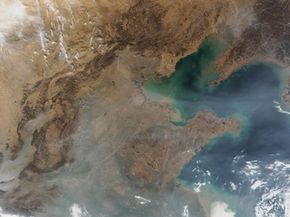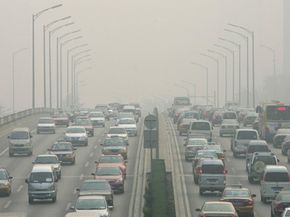Scientists have long known that air pollution causes health problems. Most attention has focused on lung issues like asthma, lung development in children and even lung cancer. It makes sense: When air is infused with harmful chemicals like sulfur dioxide, carbon monoxide and hydrocarbons, along with tiny particles of matter, our lungs are going to suffer.
These pollutants come from lots of sources, some natural, like volcanic eruptions and plants' chemical reactions, and some not so natural. Factories and cars that burn fossil fuels send tons of pollutants into the air every day. The manufacturing processes for plastics release chemicals like chlorine, sulfuric acid and (in the case of PVC) vinyl chloride. Spraying aerosol cans, exhaling cigarette smoke and burning trash all decrease the level of our air quality.
Advertisement
Some of these pollutants are producing ground-level ozone. Others fall to Earth as acid rain, and some stay airborne to cloud the skies of big cities as smog.
There's no avoiding dirty air these days. Just going outside means inhaling molecules that our lungs would be better off without, and sitting in traffic -- well, if we all had air purifiers in our cars, our lungs would thank us. But what about the rest of our bodies? Surely the damage doesn't stop at our lungs when the activities of the lungs and the heart are so closely connected.
In fact, medical science has long known that exposure to high levels of air pollution, especially particulate matter, can exacerbate or even trigger heart disease. But until the last few years, exactly how this happened was a bit of a mystery. Now, researchers have uncovered some good evidence of air pollution hurts the heart.
In this article, we'll take a look at the evidence linking air pollution and heart disease. We'll examine how certain pollutants affect the cardiovascular system and see what we can do to minimize the risk of damage.
Let's start with a quick review of the cardiopulmonary (heart-lung) system to get an idea of how breathing polluted air into our lungs directly affects the heart.
Advertisement




